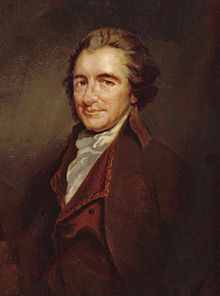There are moments in history that stand out and are remembered more than others. Moments like these are crucial because they tend to change the lives of many populations throughout our world. How could a pamphlet with a simple message make such a drastic change in the lives of the American population? There was such a pamphlet, and its writer was Thomas Paine, an American immigrant, who strove to make his American dream come true. Paine pursued his career as a writer, and joined the movement for creating a new nation. He immigrated to America in 1774, and shortly thereafter became involved in revolutionary circles in Philadelphia. In early 1776, he published an anonymous pamphlet, titled Common Sense. The pamphlet called for the end of British tyranny in the American colonies and a break with a country ruled by kings. Common Sense made its appearance at a crucial moment as the debate for American independence reached a tipping point.
Americans during this time were changing their minds about fighting the British for a few reasons. Many Americans were still undecided on the question of independence, and these Americans were the audience that Paine targeted in his pamphlet. Paine laid down several reasons for fighting for independence from the Crown. First, the casualties from the war were too large to justify anything less than independence. Second, the Patriots had a lingering affection for England that fell apart when the British began recruiting Indians, slaves, and Hessians, all of which were not Americans. Third, the colonies were closed to all overseas trade due to the British enforcing the Prohibitory Act with a blockade of colonial ports.1 Paine wanted the American people to be free from all these imperfections that he was subjected to endure while living in England. To keep the reader’s attention, he did not bring the idea of independence into the writing until his conclusion. This pamphlet, Common Sense, fought for the idea of independence with logical reasoning and fiery passion. Like its title, the denotation to having common sense is to possess simple and practical reasoning that gives a clear and wise course of action for a situation; this is what Thomas Paine worked to provide. He wrote that wanting independence for the country is not a hard decision to make due to the numerous wrongs that had been done to Americans at the hands of the British.

With the publication of this pamphlet, Paine not only galvanized Americans, but gave them a voice. His pamphlet changed the American outlook on the war. Although Paine denounced the many British injustices in the pamphlet, the English constitution was the issue that he primarily wrote about in Common Sense. This was not enough on its own to bring about the radical thoughts to the people, so he continued to argue that the people ought to blame the King. Paine stated, “it is simple common sense to break away from such a corrupt and brutal government,” which gives support to his claims that the only solution left is that of independence.2 Paine provides multiple reasons in the pamphlet for independence, especially when he writes about the promotion of the best possible government for the people.3
Common Sense contained a total of four sections, taking up the body of the pamphlet. The sections were as follows: On the Origin and Design of the Government in General, with Concise Remarks on the English Constitution; On Heredity and Hereditary Succession; Thoughts on the Present State of American Affairs; and Of the Present solely Ability of America with Some Miscellaneous Reflections. The first of these four sections states that society is a blessing, but the government is a necessary evil. Paine gives an example of this by saying that society can rally together; however, if the rally causes disruption and makes a mess of society, government will undoubtedly behave unjustly. Paine attacks the English government with this and claims it to be bloated. The second section attacks the monarchy itself. Paine attacks the Crown by saying that it came to possess power, and therefore the monarchy was born.4 Paine uses the Bible, specifically the Old Testament, to constitute his argument. He writes of how the old Hebrews were ruled by elders and judges instead of a king. He targets American Protestant followers, providing reasons to view independence in the same light as he.5 The third section that Paine covers is in regards to colonists and the growth of America. He claims that America could have grown the same way it did under the rule of England, without their support. He strongly believed America needed to be divided from England in its entirety. He did not want people to think about the ideas of independence alone, but also to take action in fighting against the tyrannical hand of the British, particularly linking tyranny and monarchy. The final section was his argument for independence. He speaks of freedoms that encompass religion, military, and living. He makes the claim that since America has no debt, the country can afford to create its own army and not rely on the English military.6
Because of the controversy that may be stirred up due to the pamphlet, Paine remained anonymous. In addition, the ability for him to be anonymous made a stronger impact because the ideas and arguments were less personal and more interchangeable within the population of Americans; these individuals were better able to identify and relate to the issues he discussed. He published his work on January 9, 1776, anonymously; the following day in Philadelphia, it appeared for a moment in the genesis of the American Revolution.7
Thomas Paine used what he believed to be his own common sense to construct the message and reality of the British tyranny, and make it stick in the minds of the audience he was addressing. He was a strong writer with beliefs that he had accumulated from his own life experiences. The pamphlet was the best form of writing at the time to reach the majority of the American people due to its low cost and wide availability. He wrote with a style that enabled him to make phrases memorable. Paine’s influence in politics also gave him the status of a great political writer. He gave the people of America the chance to make a change during this time of uncertainty and fear.
- Alan Brinkley, American History: Connecting with the Past (New York: McGraw Hill Education, 2015), 184. ↵
- Alan Brinkley, American History: Connecting with the Past (New York: McGraw Hill Education, 2015), 184. ↵
- Craig Nelson, Thomas Paine : Enlightenment, Revolution, and the Birth of Modern Nations (Penguin Books, 2006), 75. ↵
- Robert Lamb, Thomas Paine and the Idea of Human Rights (Cambridge University Press, 2005), 181. ↵
- Sophia A. Rosenfeld, Common Sense (Boston: Harvard University Press, 2011), 138. ↵
- Edward Larkin, Thomas Paine and the Literature of Revolution (Boston: Cambridge University Press, 2005), 48. ↵
- Martha A. Sherwood, “Common Sense,” (Masterplots, Fourth Edition 2010, 1–3), 45. ↵



30 comments
Kenneth Cruz
You did a very good job on this article Oscar! It looks like you really took the time to learn the history of your topic and fill in all of the possible gaps. I can tell that this was a topic that really interested you. Articles like these will surely help other history students understand these points in history better in their classes.
Vanessa Fabila-Ramirez
The first opening line really pulled me in. We all need to thank Thomas Paine for writing Common Spence. Without him I don’t even know where would we be. He was an immigrate who inspired everyone with his writing. If that doesn’t tell you, you can do anything, I don’t know what does. Its good he stayed anonymous because if he didn’t he would have been dead. He gave the country a voice without using his voice and that is inspiring.
Rosa Deyo
It’s crazy how impactful that Common Sense was on the colonists in supporting the revolution. I’ve heard of Common Sense, and I knew the general idea and theme of it, but I never knew how it was written specifically to engage its readers without them fully knowing it was about independence until the conclusion. This was such a great article!
Madeline Bloom
Thank you for this article. Thomas Paine’s common sense was a very important part of US history. The American revolution was what this concept was apart of. It showed the effectiveness of what he was explaining. You explained this concept in great detail. He made it known that it was supposed to be “common sense” to break away from the crown.
Velma Castellanos
Thomas Paine sounds like his work was very effective. This truly shows that one piece of writing can change the course of history. You did a great job in explaining the impact he made. I also can see your sources and how you used multiple sources to do proper research. I also liked how Thomas had wrote common sense anonymously. Overall I found this article interesting because I had never known much about Thomas Paine until now.
Seth Roen
It is incredible how a simple piece of writing could impact an entire nation’s future. I wonder if Thomas Paine was expecting such a success on his pamphlet in the colonies. It is interesting that his writing still influences us even to this day. It seems like that Common Sence such be read more offend by more people and taught.
Travis Green
What a great and informative article. I was of course aware of Thomas Paine and his contributions to this nations founding but I never heard about it in such detail. I now know the full extent that his book had on the people who read it or what he was really trying to say with it. It’s truly inspiring how this one book could change so many minds. You did a good job explaining why this had the impact it had.
Sabrina Drouin
Wow, great article, I knew of Thomas Paine’s “Common Sense”, but never in this much detail. I like how you explained the main idea of the pamphlet, then broke it down and explained its sections. It’s cool to learn about the thing that changed many neutral colonists’ views at the time and how he made it seem like just the “common sense” to think that we should break away from the crown. I never knew that he posted the pamphlet anonymously, but it is interesting to find out and I wonder if the colonists would’ve felt differently if he didn’t post it anonymously.
Jaedean Leija
After reading Sepulveda I really like how he told us or basically said that the pamphlet was just a piece of paper but with what Paine put on the paper was what changed everything for a lot of people. Sepulveda did a great job explaining what one of the most important event that Thomas Paine was involved in in such a casual way.
Claudia Sanchez
Thank you for your article, Oscar! I had always heard of the importance of Thomas Paine’s Common Sense when it came to the American Revolution but I never tried to look in detail as to why it was so effective or what he was saying in his work. I think this article is an inspiration to show that one’s work can have an impact on something much greater than a single person. Especially with it being anonymous, the sense that one’s words above their reputation is special and can be history changing.